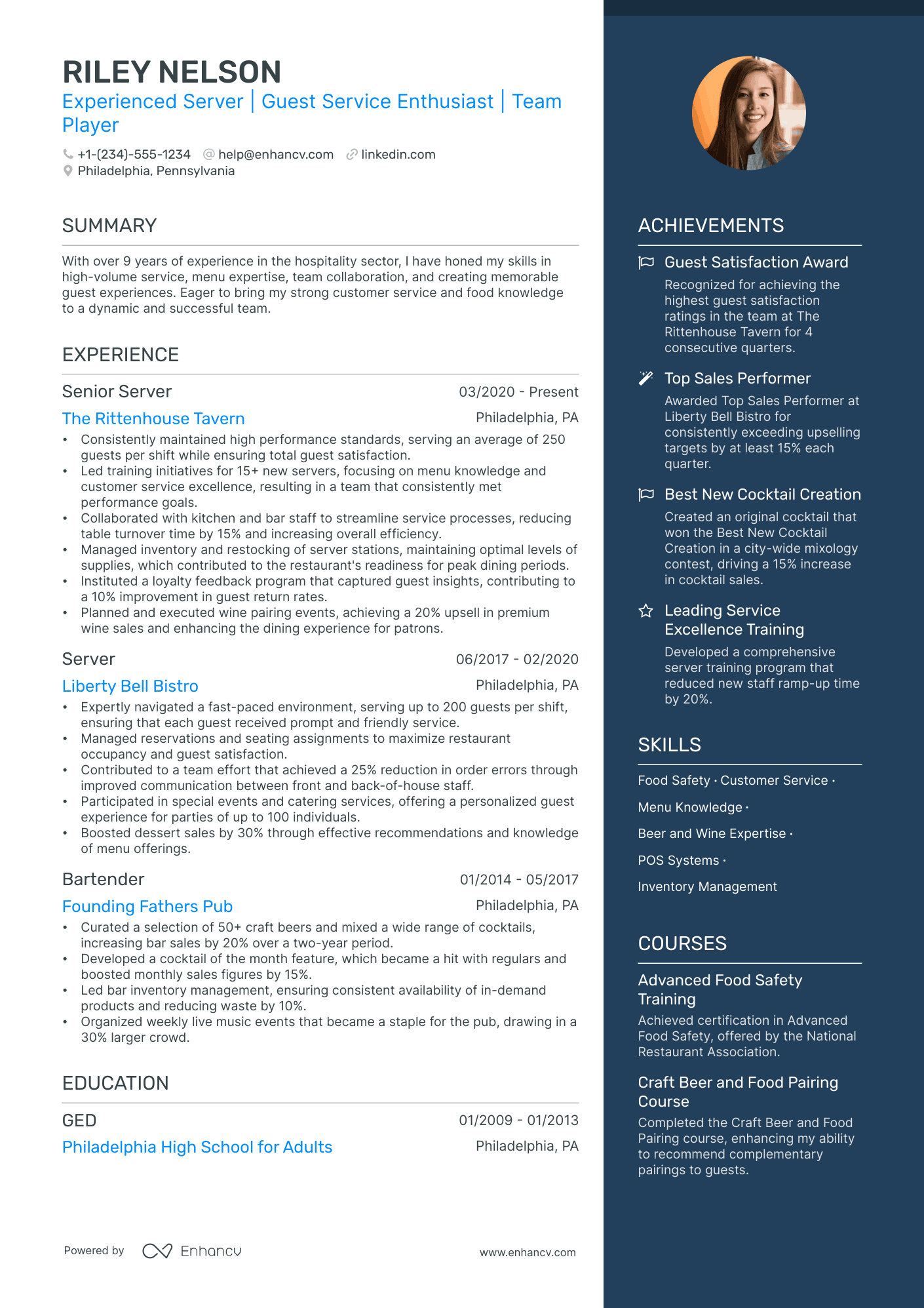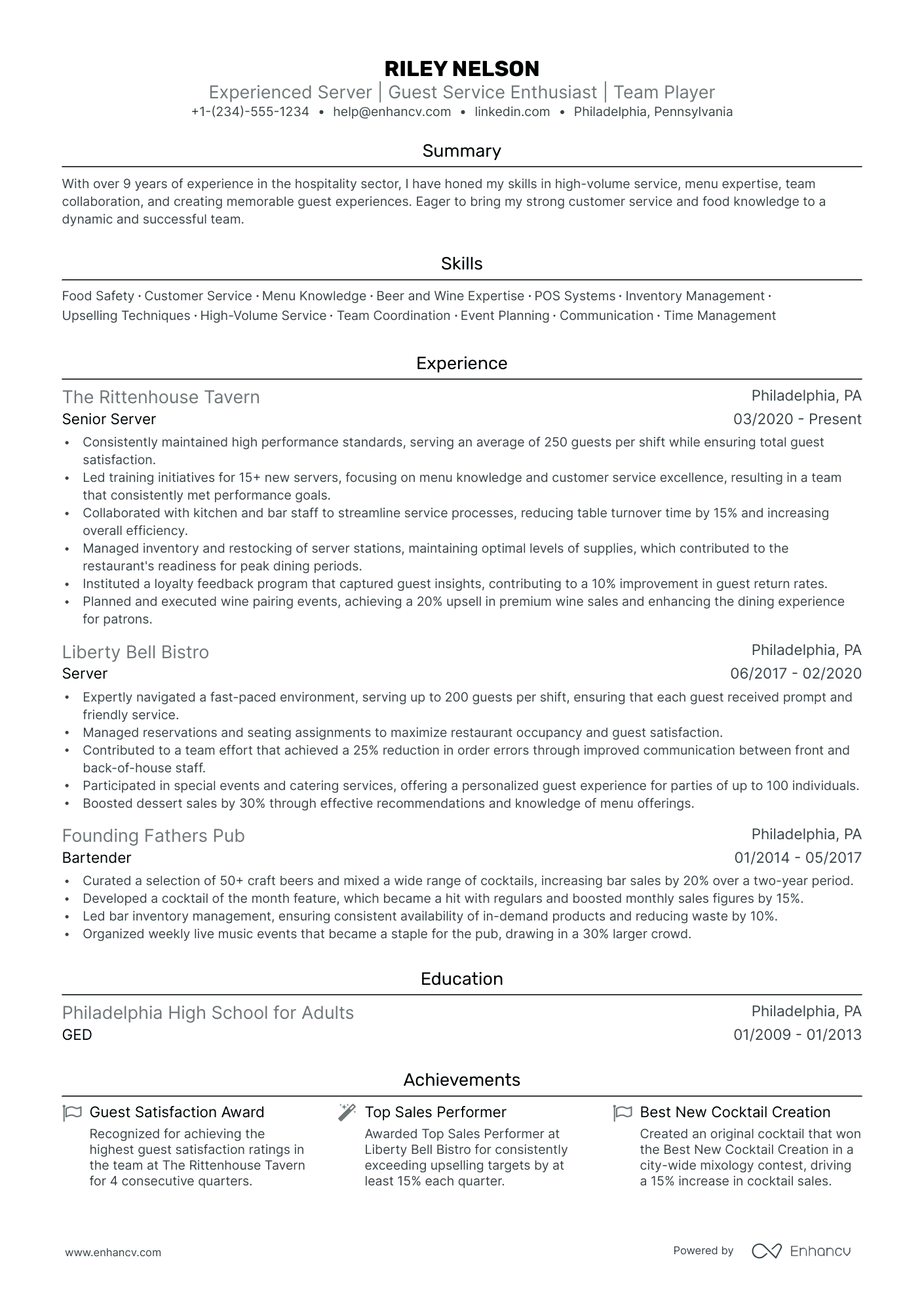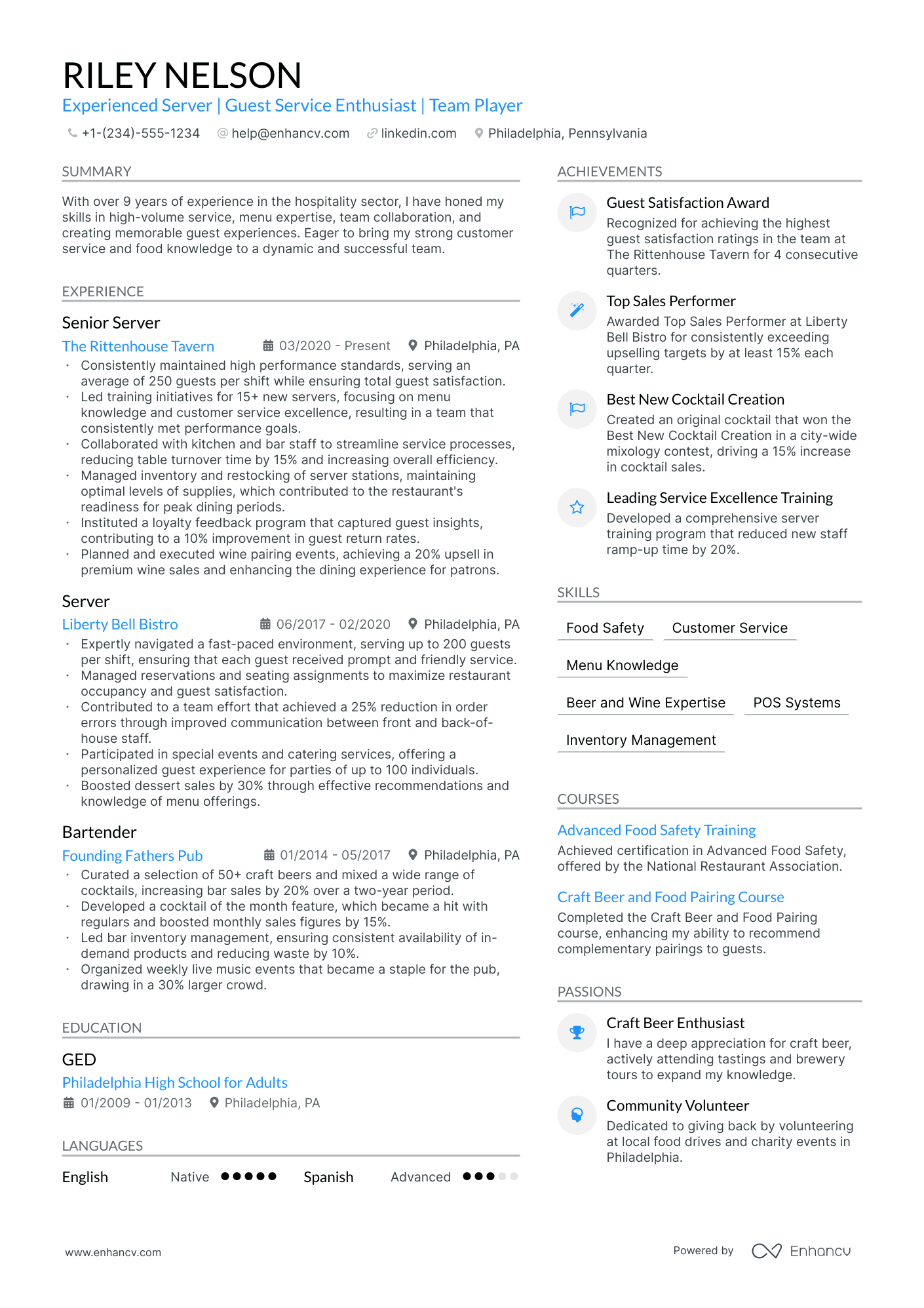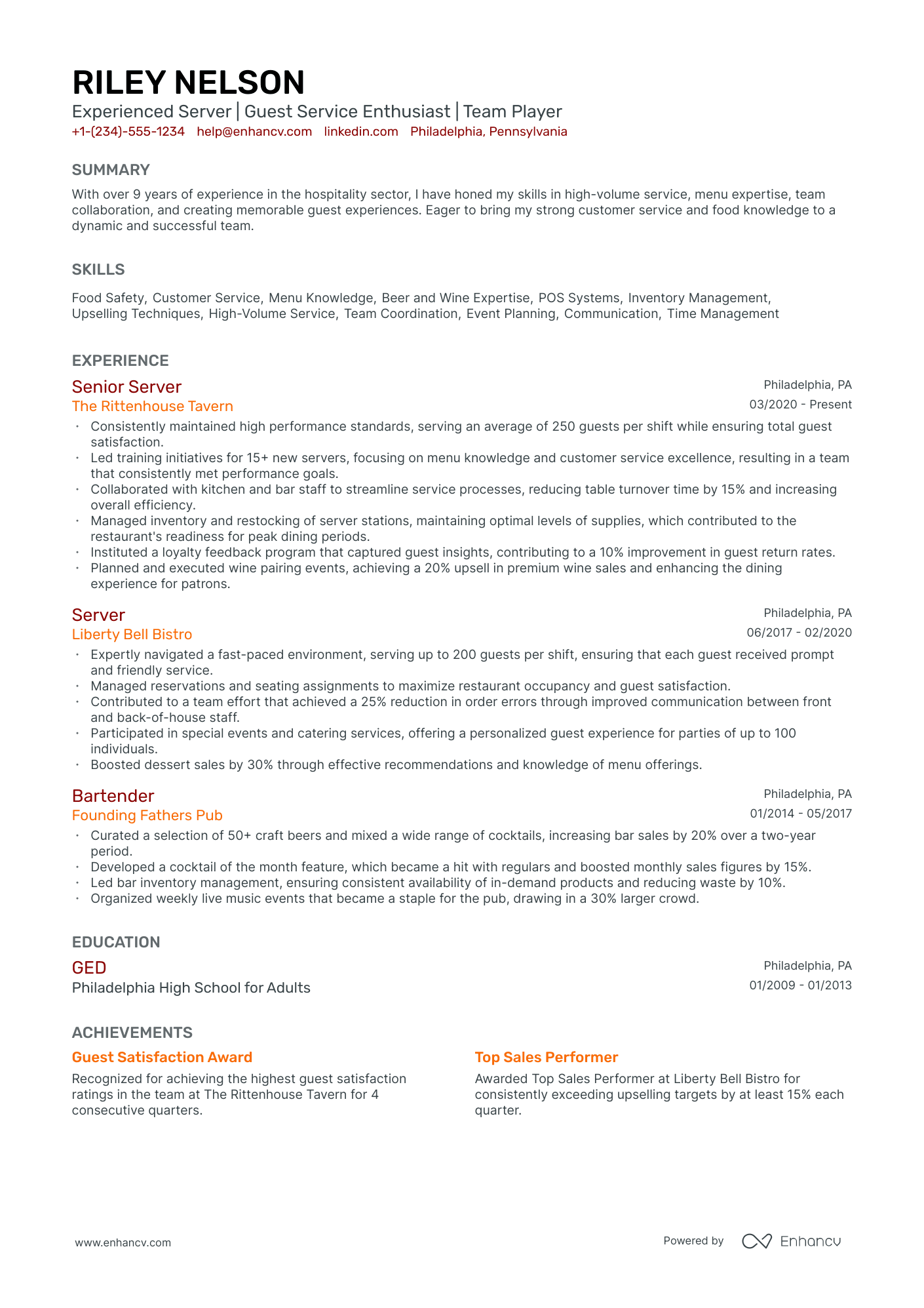One of the main resume challenges you, as a bartender server, might encounter is effectively showcasing your diverse skill set—from customer service to mixology—in a concise way. Our step-by-step guide will help you highlight your most impressive experiences and skills, ensuring your resume not only stands out but also captures the essence of your professional expertise.
- Aligning the top one-third of your bartender server resume with the role you're applying for.
- Curating your specific bartender server experience to get the attention of recruiters.
- How to list your relevant education to impress hiring managers recruiting for the bartender server role.
Discover more bartender server professional examples to help you write a job-winning resume.
Creating the best bartender server resume format: four simple steps
The most appropriate bartender server resume format is defined by precision and a systematic approach. What is more, it should reflect upon how your application will be assessed by recruiters. That is why we've gathered four of the most vital elements to keep in mind when designing your resume:
- It's all about presenting how your experience or skills align with the job. Use the reverse-chronological resume format , if your expertise is relevant to the bartender server role. Otherwise, select the functional skill-based resume format or the hybrid resume format to shift the focus to your skill set.
- Resume header - make sure you've filled out all relevant (and correct) information, like your contact details and link to your portfolio.
- Resume length - unless you've over a decade of applicable expertise in the field, stick with a one-page resume format. If you'd like to present more of your professional experience, go up to two pages.
- Resume file - submit your bartender server resume in a PDF format to ensure all information stays in the same place.
Upload & Check Your Resume
Drop your resume here or choose a file. PDF & DOCX only. Max 2MB file size.
PRO TIP
Mention specific courses or projects that are pertinent to the job you're applying for.
Traditional sections, appreciated by recruiters, for your bartender server resume:
- Clear and concise header with relevant links and contact details
- Summary or objective with precise snapshot of our career highlights and why you're a suitable candidate for the bartender server role
- Experience that goes into the nuts and bolts of your professional qualifications and success
- Skills section(-s) for more in-depth talent-alignment between job keywords and your own profile
- Education and certifications sections to further show your commitment for growth in the specific niche
What recruiters want to see on your resume:
- Experience with various bartending techniques and familiarity with cocktail recipes and preparation methods.
- Strong customer service skills and the ability to engage with patrons and create a welcoming atmosphere.
- Proficiency with point-of-sale (POS) systems and efficient handling of cash and credit card transactions.
- Knowledge of inventory management and the ability to maintain stock levels for all bar supplies and alcohol.
- Proven ability to manage high-pressure situations and maintain composure during busy service hours.
Five dos for building your bartender server resume experience section
The best strategic approach to your bartender server resume experience section is to support your particular responsibilities with actions and achievements.
For example, you could list:
- Up to six responsibilities in your day-to-day work, supported by why they're important for your role, department, or organization;
- Experience items that have helped you sustain and enhance your technical knowledge within the field, or, perhaps, have helped you grow as a professional;
- Any metrics that pinpoint your success within your past roles;
- How you've solved specific problems in your day-to-day work;
- Strategies and solutions you've implemented for growth - and how that growth was measured.
The bartender server resume experience is your best shot at making a good first impression on recruiters. That's why we've included some real-world professional examples to get you thinking about how you present your experience:
- Efficiently managed high-volume drink orders, expertly crafting more than 150 cocktails per shift with precision and speed, leading to a 30% increase in bar revenue.
- Developed a new cocktail menu in collaboration with the head bartender, featuring 10 unique drinks that boosted sales by 20% within the first quarter of implementation.
- Directed and trained a team of 4 junior bartenders, enhancing overall service quality and customer satisfaction ratings by 25%.
- Established a regular clientele through exceptional personalized service, contributing to a 15% uptick in loyal customers.
- Devised and conducted weekly inventory audits, reducing waste and discrepancies by 40% while maintaining optimal stock levels for a busy downtown location.
- Coordinated with the kitchen staff to seamlessly integrate food pairings with specialty cocktails, enhancing guest dining experience and increasing average ticket size by $8 per customer.
- Spearheaded a successful marketing initiative resulting in guest bartending events, which saw a surge in patronage on event nights by over 50%.
- Implemented a cocktail training workshop for the service staff, improving consistency across the board and reducing drink return rates by 12%.
- Oversaw the integration of a POS system which streamlined order processing and cut down on customer wait times by an average of 5 minutes.
- Played a pivotal role in the bar's renovation project, offering design insights that improved bar functionality and ambiance which attracted a more upscale clientele.
- Optimized supplier relationships, negotiating a 10% discount on premium spirits, which improved margins without compromising on quality.
- Created a customer loyalty program that increased repeat patronage by 18% within the first 6 months of launch.
- Introduced a seasonal cocktail series that generated a 25% increase in cocktail sales due to popular demand and social media buzz.
- Fostered a team environment that saw a 35% improvement in service delivery times during peak hours.
- Conducted monthly mixology classes for patrons, which generated additional revenue and offered a unique interactive experience, drawing in new clientele.
- Orchestrated a bar menu overhaul that increased sales by 22%, introducing a series of signature cocktails based on local ingredients and customer preferences.
- Handled an average of $5,000 in daily transactions with a 99.8% cash handling accuracy rate, ensuring secure and efficient financial operations.
- Created and maintained a database of patrons' favorite drinks, which personalized service and resulted in a 20% increase in tip earnings.
- Enhanced cocktail presentation techniques, resulting in a ‘Best Ambiance’ award from a local magazine and a 35% increase in Instagram mentions.
- Managed event bartending for parties up to 200 guests, ensuring efficient service and a memorable experience for attendees.
- Collaborated with local distilleries to host tasting events, leading to a 40% spike in sales of promoted spirits.
- Played a critical role in navigating the bar through the COVID-19 pandemic, pivoting to take-out cocktails and deliveries, which sustained business through lockdown periods.
- Successfully managed a socially-distanced outdoor bar setup attracting an average of 100 patrons daily, adhering to safety regulations while maintaining profitability.
- Leveraged social media to create virtual happy hour events, engaging with customers online and maintaining brand visibility during periods of restricted in-person dining.
Quantifying impact on your resume
- State the average number of customers served per shift to demonstrate efficient customer servicing capabilities.
- Include the percentage of revenue increase from upselling drinks and menu items to showcase salesmanship and contribution to business growth.
- List the number of specialty cocktails you can make to highlight mixology skills and versatility.
- Mention the exact figure of inventory management reduction to show ability in minimizing waste and controlling costs.
- Quantify the success rate of resolving customer complaints to exhibit problem-solving skills and maintaining customer satisfaction.
- Specify the amount of training sessions led for new staff to display leadership and the value added to team development.
- Document the exact increase in repeat customer visits due to your service to display the ability to build customer loyalty.
- Include the number of award recognitions or positive reviews received to prove excellence in service and reputation management.
Action verbs for your bartender server resume
Writing your bartender server experience section without any real-world experience
Professionals, lacking experience, here's how to kick-start your bartender server career:
- Substitute experience with relevant knowledge and skills, vital for the bartender server role
- Highlight any relevant certifications and education - to showcase that you have the relevant technical training for the job
- Definitely include a professional portfolio of your work so far that could include university projects or ones you've done in your free time
- Have a big focus on your transferable skills to answer what further value you'd bring about as a candidate for the bartender server job
- Include an objective to highlight how you see your professional growth, as part of the company
Recommended reads:
PRO TIP
Listing your relevant degrees or certificates on your bartender server resume is a win-win situation. Not only does it hint at your technical capabilities in the industry, but an array of soft skills, like perseverance, adaptability, and motivation.
The heart and soul of your bartender server resume: hard skills and soft skills
If you read between the lines of the bartender server role you're applying for, you'll discover that all requirements are linked with candidates' hard skills and soft skills.
What do those skills have to do with your application?
Hard or technical skills are the ones that hint at your aptitude with particular technologies. They are easy to quantify via your professional experience or various certifications.
Meanwhile, your soft skills are more difficult to assess as they are personality traits, you've gained thanks to working in different environments/teams/organizations.
Your bartender server resume skills section is the perfect opportunity to shine a light on both types of skills by:
- Dedicating a technical skills section to list up to six technologies you're apt at.
- Focusing a strengths section on your achievements, thanks to using particular people skills or technologies.
- Including a healthy balance of hard and soft skills in the skills section to answer key job requirements.
- Creating a language skills section with your proficiency level - to hint at an abundance of soft skills you've obtained, thanks to your dedication to learning a particular language.
Within the next section of this guide, stay tuned for some of the most trending hard skills and soft skills across the industry.
Top skills for your bartender server resume:
Mixology
Bartending Equipment Operation
Point of Sale (POS) Systems
Inventory Management Software
Cocktail Recipe Knowledge
Wine and Spirits Knowledge
Draft Beer System Maintenance
Glassware and Barware Familiarity
Food Safety Certification
Customer Relationship Management (CRM) Tools
Communication
Customer Service
Teamwork
Time Management
Problem-Solving
Multitasking
Attention to Detail
Adaptability
Conflict Resolution
Positive Attitude
PRO TIP
If you failed to obtain one of the certificates, as listed in the requirements, but decide to include it on your resume, make sure to include a note somewhere that you have the "relevant training, but are planning to re-take the exams". Support this statement with the actual date you're planning to be re-examined. Always be honest on your resume.
The importance of your certifications and education on your bartender server resume
Pay attention to the resume education section . It can offer clues about your skills and experiences that align with the job.
- List only tertiary education details, including the institution and dates.
- Mention your expected graduation date if you're currently studying.
- Exclude degrees unrelated to the job or field.
- Describe your education if it allows you to highlight your achievements further.
Your professional qualifications: certificates and education play a crucial role in your bartender server application. They showcase your dedication to gaining the best expertise and know-how in the field. Include any diplomas and certificates that are:
- Listed within the job requirements or could make your application stand out
- Niche to your industry and require plenty of effort to obtain
- Helping you prepare for professional growth with forward-facing know-how
- Relevant to the bartender server job - make sure to include the name of the certificate, institution you've obtained it at, and dates
Both your certificates and education section need to add further value to your application. That's why we've dedicated this next list just for you - check out some of the most popular bartender server certificates to include on your resume:
The top 5 certifications for your bartender server resume:
- ServSafe Alcohol (SA) - National Restaurant Association
- TIPS (Training for Intervention ProcedureS) - Health Communications, Inc.
- LEAD (Licensee Education on Alcohol and Drugs) - California Department of Alcoholic Beverage Control
- BASSET (Beverage Alcohol Sellers and Servers Education and Training) - Illinois Liquor Control Commission
- RAMP (Responsible Alcohol Management Program) - Pennsylvania Liquor Control Board
PRO TIP
If you're in the process of obtaining your certificate or degree, list the expected date you're supposed to graduate or be certified.
Recommended reads:
The summary or objective: focusing on the top one-third of your resume
It's a well-known fact that the top one-third of your bartender server resume is the make-it-or-break-it moment of your application. The resume summary and objective could help you further build up your professional profile.
- If you have plenty of career highlights behind your back, use the resume summary . The bartender server summary immediately focuses recruiters' attention on what matters most within your experience.
- The resume objective is the perfect choice for balancing your career achievements with your vision. Use it to state precisely how you see yourself in a couple of years' time - as part of the company you're applying for.
Both the resume summary and resume objective can be your value pitch to potential employers: answering what makes your application unique and the top choice for the bartender server role. They both have to be specific and tailored - as there's no one-size-fits-all approach to writing your bartender server summary or objective. Use the bartender server examples below as a starting point:
Resume summaries for a bartender server job
- With over 5 years of experience as a bartender in high-traffic venues in downtown New York, I bring a comprehensive skill set that includes expert cocktail crafting, an extensive knowledge of spirits, and a record of elevating customer satisfaction. My tenure has been marked by being awarded Bartender of the Year in 2020 by the New York Nightlife Association.
- As a seasoned mixologist with 10 years behind the bar of an award-winning jazz club in New Orleans, I possess a deep understanding of creating a memorable guest experience, managing fast-paced drink preparation, and mentoring junior bartenders. My leadership contributed to the club being recognized as "Best Live Music Venue" for three consecutive years.
- Transitioning from a career in sales with exceptional interpersonal skills and a Bachelor's degree in Hospitality Management, I am eager to apply my expertise in customer relations and a passion for fine dining and spirits in the context of a bustling metropolitan cocktail lounge. Master communicator with a proven sales record of exceeding targets by 25%.
- After a successful stint in corporate event planning, where I managed events for Fortune 500 companies, I am primed to bring my organizational skills, attention to detail, and zeal for creating perfect events to the fast-paced world of bartending, with a commitment to ensuring every guest leaves with a memorable experience.
- Aspiring to leverage my interpersonal skills and enthusiasm for craft cocktails, my objective is to immerse myself in the dynamic environment of a craft cocktail bar, learn from seasoned professionals, and contribute to an establishment known for its commitment to quality and innovation. Eager to develop a deep understanding of mixology and customer service excellence.
- Keen on beginning a journey in the hospitality industry, my goal is to join a team where I can harness my quick learning abilities, robust work ethic, and sincere interest in the intricacies of beverage service to provide guests with an unforgettable patronage experience, all while absorbing knowledge from experienced bar staff.
Beyond your bartender server resume basics - extra sections
Ensure your bartender server resume stands out from the crowd by spicing it up with a couple of supplementary sections that showcase your:
- Prizes - as a special nod to what matters most in the field;
- Projects - ones that would really further support your application;
- Hobbies - include only if you think they'd further your chances at landing the role with personality
- Community impact - to hint at the causes you care about.
Key takeaways
Writing your bartender server resume can be a structured and simple experience, once you better understand the organization's requirements for the role you're applying to. To sum up, we'd like to remind you to:
- Always select which experiences, skills, and achievements to feature on your resume based on relevancy to the role;
- In your resume summary, ensure you've cherry-picked your top achievements and matched them with the job ad's skills;
- Submit your bartender server resume as a one or two-page long document at the most, in a PDF format;
- Select industry leading certifications and list your higher education to highlight you have the basis for technical know-how;
- Quantify your people's skills through various resume sections (e.g. Strengths, Hobbies and interests, etc.) to show recruiters how your profile aligns with the organizational culture.





